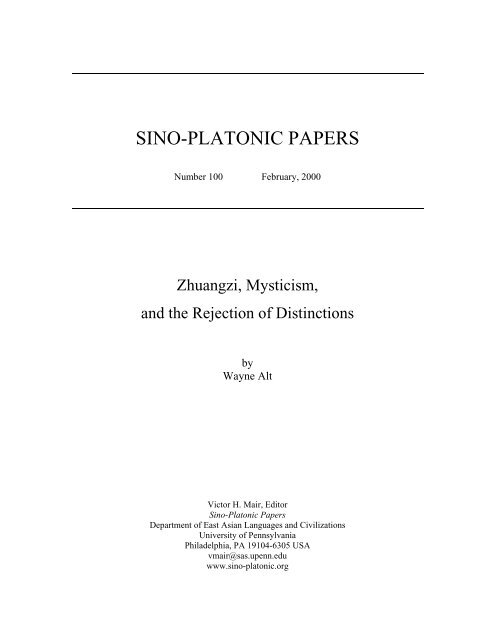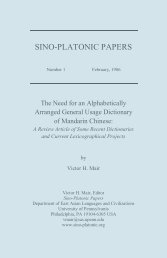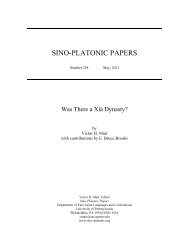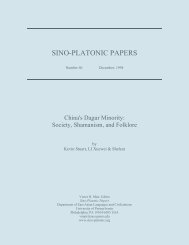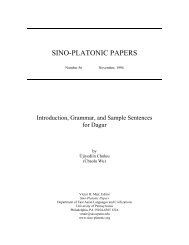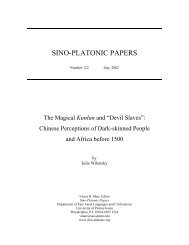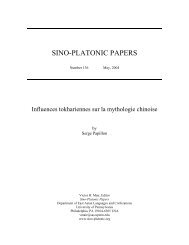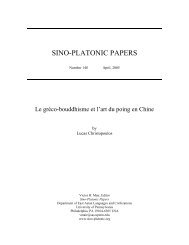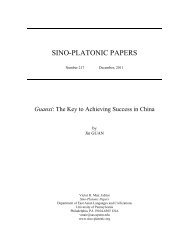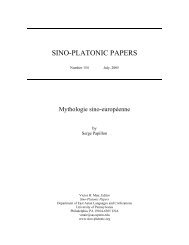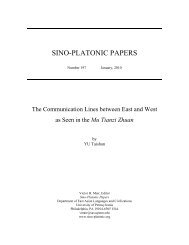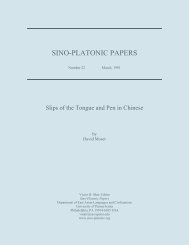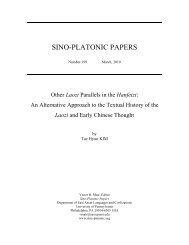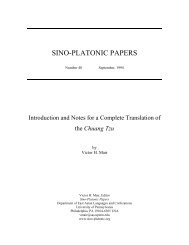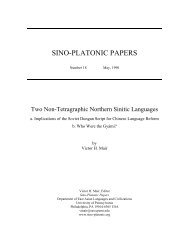Zhuangzi, Mysticism, and the Rejection of Distinctions
Zhuangzi, Mysticism, and the Rejection of Distinctions
Zhuangzi, Mysticism, and the Rejection of Distinctions
Create successful ePaper yourself
Turn your PDF publications into a flip-book with our unique Google optimized e-Paper software.
SINO-PLATONIC PAPERS<br />
Number 100 February, 2000<br />
<strong>Zhuangzi</strong>, <strong>Mysticism</strong>,<br />
<strong>and</strong> <strong>the</strong> <strong>Rejection</strong> <strong>of</strong> <strong>Distinctions</strong><br />
by<br />
Wayne Alt<br />
Victor H. Mair, Editor<br />
Sino-Platonic Papers<br />
Department <strong>of</strong> East Asian Languages <strong>and</strong> Civilizations<br />
University <strong>of</strong> Pennsylvania<br />
Philadelphia, PA 19104-6305 USA<br />
vmair@sas.upenn.edu<br />
www.sino-platonic.org
SINO-PLATONIC PAPERS<br />
FOUNDED 1986<br />
Editor-in-Chief<br />
VICTOR H. MAIR<br />
Associate Editors<br />
PAULA ROBERTS MARK SWOFFORD<br />
ISSN<br />
2157-9679 (print) 2157-9687 (online)<br />
SINO-PLATONIC PAPERS is an occasional series dedicated to making available to specialists<br />
<strong>and</strong> <strong>the</strong> interested public <strong>the</strong> results <strong>of</strong> research that, because <strong>of</strong> its unconventional or controversial<br />
nature, might o<strong>the</strong>rwise go unpublished. The editor-in-chief actively encourages younger, not yet<br />
well established, scholars <strong>and</strong> independent authors to submit manuscripts for consideration.<br />
Contributions in any <strong>of</strong> <strong>the</strong> major scholarly languages <strong>of</strong> <strong>the</strong> world, including romanized modern<br />
st<strong>and</strong>ard M<strong>and</strong>arin (MSM) <strong>and</strong> Japanese, are acceptable. In special circumstances, papers written<br />
in one <strong>of</strong> <strong>the</strong> Sinitic topolects (fangyan) may be considered for publication.<br />
Although <strong>the</strong> chief focus <strong>of</strong> Sino-Platonic Papers is on <strong>the</strong> intercultural relations <strong>of</strong> China with<br />
o<strong>the</strong>r peoples, challenging <strong>and</strong> creative studies on a wide variety <strong>of</strong> philological subjects will be<br />
entertained. This series is not <strong>the</strong> place for safe, sober, <strong>and</strong> stodgy presentations. Sino- Platonic<br />
Papers prefers lively work that, while taking reasonable risks to advance <strong>the</strong> field, capitalizes on<br />
brilliant new insights into <strong>the</strong> development <strong>of</strong> civilization.<br />
Submissions are regularly sent out to be refereed, <strong>and</strong> extensive editorial suggestions for revision<br />
may be <strong>of</strong>fered.<br />
Sino-Platonic Papers emphasizes substance over form. We do, however, strongly recommend that<br />
prospective authors consult our style guidelines at www.sino-platonic.org/stylesheet.doc.<br />
Manuscripts should be submitted as electronic files, preferably in Micros<strong>of</strong>t Word format. You<br />
may wish to use our sample document template, available here: www.sino-platonic.org/spp.dot.<br />
Beginning with issue no. 171, Sino-Platonic Papers has been published electronically on <strong>the</strong> Web<br />
at www.sino-platonic.org. Issues 1–170, however, will continue to be sold as paper copies until<br />
our stock runs out, after which <strong>the</strong>y too will be made available on <strong>the</strong> Web.<br />
Please note: When <strong>the</strong> editor goes on an expedition or research trip, all operations (including<br />
filling orders) may temporarily cease for up to three months at a time. In such circumstances, those<br />
who wish to purchase various issues <strong>of</strong> SPP are requested to wait patiently until he returns. If<br />
issues are urgently needed while <strong>the</strong> editor is away, <strong>the</strong>y may be requested through Interlibrary<br />
Loan. You should also check our Web site at www.sino-platonic.org, as back issues are regularly<br />
rereleased for free as PDF editions.<br />
Sino-Platonic Papers is licensed under <strong>the</strong> Creative Commons Attribution-NonCommercial-<br />
NoDerivs 2.5 License. To view a copy <strong>of</strong> this license, visit<br />
http://creativecommons.org/licenses/by-nc-nd/2.5/ or send a letter to Creative Commons, 543<br />
Howard Street, 5th Floor, San Francisco, California, 94105, USA.
Sino-Platonic Papers, 100 (February,2ooo) 9<br />
else could it be? The fact that some people are willing to debate anything does<br />
not entail that so might not be so. It merely suggests that if people do not<br />
underst<strong>and</strong> things fully, <strong>the</strong>y can squ<strong>and</strong>er time <strong>and</strong> energy by arguing. Thus,<br />
this passage does not support Graham's claim that Zhaungzi advised us to<br />
"leave all distinctions behind."<br />
According to Maspero, <strong>Zhuangzi</strong> thinks reason obscures <strong>the</strong> ineffable<br />
intuitive truth. Graham thinks <strong>Zhuangzi</strong> advises us to leave all distinctions<br />
behind for this truth. However, his translation <strong>of</strong> <strong>the</strong> passage that he thinks<br />
supports <strong>the</strong> claim that <strong>Zhuangzi</strong> made this extreme recommendation distorts <strong>the</strong><br />
text.<br />
Mair's.<br />
To divide, <strong>the</strong>n, is to leave something undivided; to [<br />
1 argue out alternatives is to have something<br />
which is nei<strong>the</strong>r alternative. "What?" you ask. The<br />
sage keeps it in his breast, common men argue it out<br />
to show it to each o<strong>the</strong>r. Hence I say, to argue out<br />
alternatives is to have something you fail to see?O<br />
bian m<br />
Once again, Graham's translation differs considerably from Victor<br />
Therefore, wherever <strong>the</strong>re is analysis, something is<br />
left unanalyzed. Wherever <strong>the</strong>re is dispute, something<br />
is left undisputed. You may ask, "How can this be?"<br />
The sages embrace all things, but ordinary people<br />
dispute over <strong>the</strong>m to show <strong>of</strong>f to each o<strong>the</strong>r.<br />
Therefore it is said, wherever <strong>the</strong>re is dispute,<br />
something is left unseen. 21
Sino-Platonic Papers, 100 (February, 2000) 11<br />
Mair <strong>and</strong> Graham also differ about why <strong>Zhuangzi</strong> thinks people argue.<br />
Mair's <strong>Zhuangzi</strong> thinks <strong>the</strong>y argue "to show <strong>of</strong>f to each o<strong>the</strong>r." Graham's<br />
thinks <strong>the</strong>y argue about <strong>the</strong> mystical truth <strong>the</strong> sages allegedly hold in <strong>the</strong>ir<br />
breasts in order "to show it to each o<strong>the</strong>r." Mair's suggestion is plausible.<br />
People will argue about anything to impress each o<strong>the</strong>r with <strong>the</strong>ir wits. But <strong>the</strong><br />
idea that people can show each o<strong>the</strong>r something by arguing about it, be it a<br />
peanut or <strong>the</strong> Dark Pearl, is ridiculous. So <strong>Zhuangzi</strong> did not think that we<br />
should ab<strong>and</strong>on distinctions because <strong>the</strong>y lead to contradictions, or because <strong>the</strong>y<br />
obscure <strong>the</strong> mystical truth. Nor did he think, as we shall see in <strong>the</strong> next section,<br />
that we should ab<strong>and</strong>on <strong>the</strong>m because <strong>the</strong>y interfere with thought <strong>and</strong> action.<br />
3. Did <strong>Zhuangzi</strong> make distinctions?<br />
Graham proclaiins,<br />
Like all great anti-rationalists, Chuang-tzu has his<br />
reasons for not listening to reason. He develops <strong>the</strong>m<br />
in <strong>the</strong> pieces assembled in [chapter two which shows]<br />
that Chuang-tzu learned more than one might have<br />
expected from his rationalist mentor Hui Shih. 22<br />
He thinks Hui Shi convinced <strong>Zhuangzi</strong> that attempts to "divide" fen 5t space<br />
<strong>and</strong> time with language-based systems <strong>of</strong> measurement inevitably generate<br />
contradictions. He fur<strong>the</strong>r claims that Hui Shi impugned only spatial <strong>and</strong><br />
temporal divisions, <strong>and</strong> adds,
12 Wayne Alt, "<strong>Zhuangzi</strong>, <strong>Mysticism</strong>, <strong>and</strong> <strong>the</strong> <strong>Rejection</strong> <strong>of</strong> <strong>Distinctions</strong>"<br />
... it will take only one more step to observe that all<br />
reasoning depends on making [bian] distinctions, <strong>and</strong><br />
to reach <strong>the</strong> conclusion that we should ab<strong>and</strong>on<br />
reason [my italics] for <strong>the</strong> immediate experience <strong>of</strong> an<br />
undifferentiated world, transforming , All are one'<br />
from a moral into a mystical affirmation. It is in<br />
[chapter two] that Chuang-tzu takes this step?3<br />
Graham describes <strong>the</strong> taking <strong>of</strong> this step as a state <strong>of</strong> " ... illumination in<br />
which all distinctions lapse, self <strong>and</strong> o<strong>the</strong>r, life <strong>and</strong> death, <strong>and</strong> it is no longer I<br />
(who) act but Heaven. ,,24 A "lapsed" distinction is presumably a distinction one<br />
no longer uses. It is not necessarily a distinction that one forgets, however.<br />
Someone's distinction between God <strong>and</strong> <strong>the</strong> devil, for example, may have<br />
lapsed in that one no longer takes it seriously, even though one acknowledges<br />
that o<strong>the</strong>rs do. But, for obvious reasons, no one could allow all distinctions to<br />
lapse.<br />
Zbuangzi never took <strong>the</strong> step Graham claims he took. He never refused<br />
to make distinctions or allowed <strong>the</strong>m all to lapse. On <strong>the</strong> contrmy, many <strong>of</strong><br />
<strong>Zhuangzi</strong>'s parables stress <strong>the</strong> importance <strong>of</strong> being mindful <strong>of</strong> distinctions.<br />
Cook Ding's skill, for example, distinguishes <strong>the</strong> jian 1iJ, "spaces" in an ox's<br />
carcass from its veins, ligaments, tendons <strong>and</strong> bones. The importance <strong>of</strong><br />
distinctions for <strong>the</strong> successful practice <strong>of</strong> a craft is fur<strong>the</strong>r illustrated in <strong>the</strong><br />
parable <strong>of</strong> Duke Huan <strong>and</strong> Wheelwright Bian at <strong>the</strong> end <strong>of</strong> <strong>the</strong> Ti<strong>and</strong>ao chapter.
Sino-Platonic Papers, 100 (February,2000) 15<br />
doing it can interfere with performance. 28 The ability to wright wheels, butcher<br />
oxen, swim, <strong>and</strong> so on, can <strong>and</strong> perhaps should be carried out with minimal<br />
conscious reflection on <strong>the</strong> process. If one simply ceased to make distinctions,<br />
however, <strong>the</strong> result would be disastrous. Yet Graham claims that <strong>Zhuangzi</strong><br />
thinks we should refuse to make <strong>the</strong>m since <strong>the</strong>y interfere with perfect action.<br />
He says,<br />
... it is precisely when we distinguish alternatives, <strong>the</strong><br />
right <strong>and</strong> <strong>the</strong> wrong, <strong>the</strong> beneficial <strong>and</strong> <strong>the</strong> harmful,<br />
self <strong>and</strong> o<strong>the</strong>r, that we cut ourselves <strong>of</strong>f from <strong>the</strong><br />
world <strong>of</strong> objectivity, <strong>and</strong> lose <strong>the</strong> capacity <strong>of</strong> <strong>the</strong><br />
angler, <strong>the</strong> carpenter <strong>and</strong> <strong>the</strong> swimmer to heed his<br />
total situation with undivided attention <strong>and</strong> respond<br />
with <strong>the</strong> immediacy <strong>of</strong> a shadow to a shape <strong>and</strong> an<br />
echo to a sound. 29<br />
To attain perfection in <strong>the</strong>ir actions, perhaps artisans <strong>and</strong> sages should<br />
stop thinking about <strong>the</strong> moral <strong>and</strong> practical worth <strong>of</strong> what <strong>the</strong>y are doing.<br />
Moreover, when performing a task, perhaps we should stop thinking altoge<strong>the</strong>r,<br />
even about <strong>the</strong> distinctions necessaty to complete <strong>the</strong> task. But swimmers <strong>and</strong><br />
carpenters, even when acting with undivided attention, do not refuse to<br />
distinguish up from down or right from left. And anglers who succeed know <strong>the</strong><br />
difference between a' bite <strong>and</strong> a snag. Anyone who stepped beyond, not only<br />
spatial <strong>and</strong> temporal fen divisions, but who refused to make, allowed to lapse,<br />
or left behind all bian dichotomies, would be unable to act, especially with <strong>the</strong>
16 Wayne Alt, "Zbuangzi, <strong>Mysticism</strong>, <strong>and</strong> <strong>the</strong> <strong>Rejection</strong> <strong>of</strong> <strong>Distinctions</strong>"<br />
consummate skill <strong>of</strong> a master artisan or a sage, <strong>and</strong> would be unable to use<br />
language for any purpose. 30 So Graham's claim that <strong>Zhuangzi</strong> ab<strong>and</strong>oned<br />
distinctions, ei<strong>the</strong>r for <strong>the</strong> mystical experience <strong>of</strong> "an undifferentiated world," or<br />
<strong>the</strong> practical result <strong>of</strong> having <strong>the</strong> ''undivided attention" <strong>of</strong> a master artisan or a<br />
sage, is simply erroneous.<br />
4. Graham's Legacy.<br />
Most English speaking scholars <strong>of</strong> <strong>the</strong> <strong>Zhuangzi</strong> are familiar with<br />
Graham's translation <strong>and</strong> interpretation <strong>of</strong> <strong>the</strong> inner chapters, but not all <strong>of</strong> <strong>the</strong>m<br />
are part <strong>of</strong> his interpretive legacy. To be a part <strong>of</strong> Graham's legacy one must<br />
incorporate elements <strong>of</strong> his "anti-rationalist" interpretation into one's own<br />
account <strong>of</strong> what is going on in <strong>the</strong> inner chapters.<br />
For example, in comparing <strong>Zhuangzi</strong> to Buddhism's most pr<strong>of</strong>ound<br />
philosopher, Nagarjuna, David Loy claims that both thinkers were" ... anti<br />
rationalists who present us with strong arguments for not believing in reason. ,,31<br />
In making out his case that <strong>Zhuangzi</strong> was an "anti-rationalist," however, Loy<br />
alludes to both moderate <strong>and</strong> extreme versions <strong>of</strong> <strong>Zhuangzi</strong>'s advice to ab<strong>and</strong>on<br />
distinctions.<br />
He quotes Graham's claim that <strong>Zhuangzi</strong> thinks people are mistaken to<br />
suppose, " ... life presents us with issues that must be formulated in words so that<br />
we can envision' alternatives <strong>and</strong> find reasons for preferring one to <strong>the</strong> o<strong>the</strong>r. ,,32
Sino-Platonic Papers, 100 (Febl"lJaIY,.-2000).. 17<br />
This relatively moderate advice to ab<strong>and</strong>on moral distinctions, such as <strong>the</strong><br />
distinction between right <strong>and</strong> wrong, is supported by Mair's translation <strong>of</strong> an<br />
important passage from chapter two: ''Now, <strong>the</strong> manifestation <strong>of</strong> right <strong>and</strong><br />
wrong is what diminishes <strong>the</strong> Way. ,,33 But Graham insists that in this passage<br />
Zbuangzi is recommending more than moral antinomianism. His translation<br />
says, "The lighting up <strong>of</strong> 'That's it, that's not' is <strong>the</strong> reason why <strong>the</strong> Way is<br />
flawed. ,,34 Mair's translation suggests that <strong>Zhuangzi</strong> thought our ability to<br />
follow <strong>the</strong> Daoist path <strong>of</strong> action is diminished when we become ensnared by <strong>the</strong><br />
phony distinctions <strong>and</strong> disputations <strong>of</strong> moralists. So we should avoid making<br />
moral distinctions. Graham, on <strong>the</strong> o<strong>the</strong>r h<strong>and</strong>, treats <strong>the</strong> Way like <strong>the</strong> Dark<br />
Pearl. When we try to light it up by distinguishing what is from what is not, our<br />
underst<strong>and</strong>ing <strong>of</strong> it is distorted. So we should avoid making distinctions.<br />
Loy follows Graham's translation, not Mair's; so his interpretation <strong>of</strong><br />
Zbuangzi is extreme <strong>and</strong> anti-rational. He overlooks <strong>the</strong> possibility that<br />
<strong>Zhuangzi</strong> was speaking <strong>of</strong> shi <strong>and</strong> fei as moral terms, like one <strong>of</strong> our uses <strong>of</strong> <strong>the</strong><br />
English terms "right" <strong>and</strong> ''wrong. " That would have allowed for a moderate<br />
treatment <strong>of</strong> <strong>the</strong> advice to ab<strong>and</strong>on distinctions, namely: "Just ab<strong>and</strong>on <strong>the</strong><br />
moral ones." Loy is mislead by Graham's translation <strong>of</strong>shi-fei as "That's it,<br />
that's not." He assumes that by shi-fei <strong>Zhuangzi</strong> understood, " ... <strong>the</strong><br />
discriminations that we have allleamed to make in <strong>the</strong> process <strong>of</strong> coming to
18 Wayne Alt, "<strong>Zhuangzi</strong>, <strong>Mysticism</strong>, <strong>and</strong> <strong>the</strong> <strong>Rejection</strong> <strong>of</strong> <strong>Distinctions</strong>"<br />
experience <strong>the</strong> world in <strong>the</strong> 'ordinary' way o<strong>the</strong>r people do. ,,35 He <strong>the</strong>n<br />
concludes that <strong>the</strong> problem <strong>of</strong> "That's it, that's not" is that when we make<br />
ordinary distinctions, "<strong>the</strong> Dao is obscured. ,,36 This conclusion brings to mind<br />
Maspero's account <strong>of</strong> <strong>the</strong> Dark Pearl. Whenever we speak <strong>and</strong> reason, we lose<br />
sight <strong>of</strong> it. The problem <strong>of</strong> "that's it, that's not," however, is not that we lose<br />
sight <strong>of</strong> <strong>the</strong> mystical when we make ordinary distinctions. The problem is that<br />
were we to ab<strong>and</strong>on ordinary distinctions, we would be unable to think <strong>and</strong><br />
function, assuming we were alive at all.<br />
Ano<strong>the</strong>r <strong>of</strong> Graham's legatees, Daniel Coyle, claims, "<strong>Zhuangzi</strong> suggests .<br />
that we practice 'unlearning distinctions,' for it is precisely in <strong>the</strong> act <strong>of</strong> making<br />
distinctions that <strong>the</strong> dao is lost. ,,37 The claim that "<strong>the</strong> dao is lost" when we<br />
make distinctions alludes, once again, to <strong>the</strong> myth <strong>of</strong> <strong>the</strong> Dark Pearl. The sorry<br />
suggestion is that we must ab<strong>and</strong>on language <strong>and</strong> reason, ifwe want <strong>the</strong> real<br />
tnlth. But Coyle borrows <strong>the</strong> phrase "unlearning distinctions" from Graham, not<br />
<strong>the</strong> <strong>Zhuangzi</strong>!<br />
Lee Yearly tries to side step <strong>the</strong> mysticism <strong>of</strong> <strong>the</strong> Dark Pearl. He thinks<br />
<strong>Zhuangzi</strong>'s philosophical project is to explain <strong>and</strong> encourage "intra-worldly<br />
mysticism." Intra-worldly mystics do not identify with ''ultimate reality," but<br />
seek instead "a way through <strong>the</strong> world. ,,38 Apparently <strong>the</strong>y find it, or are aided<br />
in <strong>the</strong>ir quest for it, when <strong>the</strong>ir actions are motivated by "transcendent" drives.
Sino-Platonic Papers, 100 (February, 2000) 27<br />
25. Mair, W<strong>and</strong>ering on <strong>the</strong> Way., p. 129.<br />
26. ibid., p. 19.<br />
27. Graham, "Rationalism <strong>and</strong> Anti-Rationalism in Pre-Buddhist China," p. 107.<br />
28. Graham says: "Chuang-tzu is deeply interested in types <strong>of</strong> ordinary behavior<br />
which thinking inhibits <strong>and</strong> types <strong>of</strong> knowledge which cannot be verbally<br />
expressed. A player winning while <strong>the</strong> stakes were low pauses to think when<br />
<strong>the</strong> stakes are raised, <strong>and</strong> loses his knack; a woman discovers she is beautiful<br />
<strong>and</strong> ceases to be beautiful." In A. C. Graham, "Reason in Chinese<br />
Philosophical Tradition," in The Legacy <strong>of</strong> China.. edited by Raymond<br />
Dawson, (Oxford: Carendon Press, 1964).<br />
29. A. C. Graham, Later Momst Logic, Ethics <strong>and</strong> Science, (Hong Kong:<br />
Chinese University Press, 1978), p. 21.<br />
30. Mair's translation <strong>of</strong>lun as "to discuss" differs from that <strong>of</strong> Graham who<br />
suggests "to sort out," "grade," or "arrange" as its equivalents. But even if<br />
grading, sorting <strong>and</strong> arranging require no language skills, does Graham really<br />
think that someone could skillfully perform <strong>the</strong>m while making no<br />
distinctions?<br />
31. David Loy, "<strong>Zhuangzi</strong> <strong>and</strong> Nagarjuna on <strong>the</strong> Truth <strong>of</strong> No Truth," in Essays<br />
on Skepticism, Relativism, <strong>and</strong> Ethics in <strong>the</strong> <strong>Zhuangzi</strong>, edited by Paul
Sino-Platonic Papers, 100 (February, 2000) 29<br />
(up, down, left, right, front, back), <strong>the</strong> sage (grants) its existence, but does<br />
not discuss it."<br />
43. Robert Eno, "Cook Ding's Dao <strong>and</strong> <strong>the</strong> Limits <strong>of</strong> Philosophy," in Kjelberg<br />
<strong>and</strong> Ivanhoe, op. cit., p. 128.<br />
44. ibid., p. 132.<br />
45. ibid., p. 133.<br />
46. ibid.<br />
47. Philip J. Ivanhoe, "Taoism," in The Cambridge Dictionary <strong>of</strong> Philosophy,<br />
General Editor, Robert Audi, (Cambridge: Cambridge University Press, 1995),<br />
p.787.<br />
48. Mair, ibid., p p. 163-164.
Since June 2006, all new issues <strong>of</strong> Sino-Platonic Papers have been published<br />
electronically on <strong>the</strong> Web <strong>and</strong> are accessible to readers at no charge. Back issues<br />
are also being released periodically in e-editions, also free. For a complete catalog<br />
<strong>of</strong> Sino-Platonic Papers, with links to free issues, visit <strong>the</strong> SPP Web site.<br />
www.sino-platonic.org


